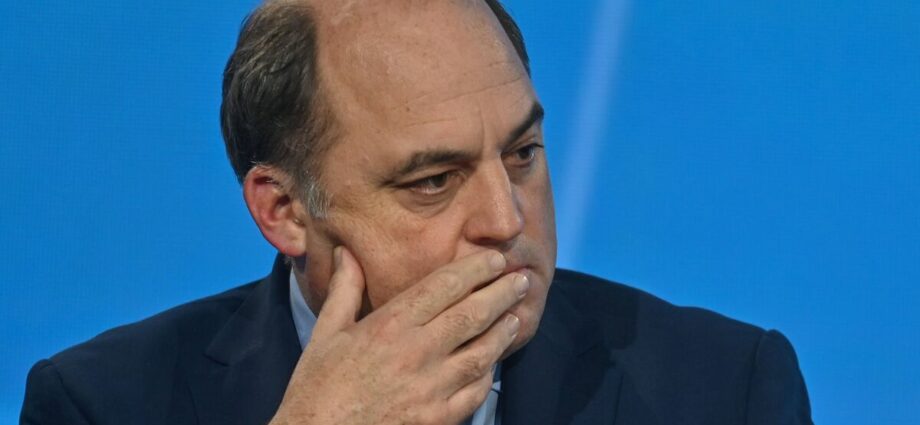Ben Wallace grilled on US’ national security document
We use your sign-up to provide content in ways you’ve consented to and to improve our understanding of you. This may include adverts from us and 3rd parties based on our understanding. You can unsubscribe at any time. More info
Defence Secretary Ben Wallace has been warned by a senior US general the British Army is no longer regarded as a top fighting force – and is barely on the same level as Germany and Italy. Insiders have also suggested Prime Minister Rishi Sunak is now facing a pivotal moment in funding the nation’s military after years of cost-cutting.
Sources told Sky News the general offered his assessment during a frank exchange with Mr Wallace and other high-ranking officials last autumn.
The United States, Russia, China and France were all seen as tier-one military powers, with tier two referring to lower-ranking nations, such as Germany and Italy, he explained.
Referring to the UK’s army, he said: “You haven’t got a tier one. It’s barely tier two.”
Insiders claim Britain’s armed forces would run out of ammunition in days should they be called upon to fight, which means the nation would have no ability to defend its skies against the kinds of missile and drone strikes Ukraine is currently dealing with.


Additionally, roughly 30 percent of UK forces on high readiness are currently reservists unable to mobilise within NATO timelines, and the majority of the army’s armoured vehicles, including tanks, were built between 30 to 60 years ago.
One of the sources said Britain’s decline in war-fighting capability needed to reverse quickly after Vladimir Putin’s Ukraine invasion almost a year ago.
They stressed: “Bottom line… it’s an entire service unable to protect the UK and our allies for a decade.”
Without swift remedial action, Mr Sunak was warned he was at risk of failing in his role as “wartime prime minister”.
He has been urged to boost the defence budget by a minimum of £3billion a year, halt plans to cut the size of the army and take steps to strengthen the UK’s ability to buy weapons and ammunition rapidly.
JUST IN: Ukraine MP hails UK’s ’crucial’ role in securing tanks for Zelensky


Stuart Crawford, who spent 20 years in the Royal Tank Regiment, reaching the rank of Lieutenant Colonel, has voiced similar concerns.
A memo issued earlier by General Sir Patrick Sanders, who as Chief of the General Staff is the head of the professional British Army, warned the decision to donate Challenger 2 tanks to Ukraine has left Britain’s military “temporarily weaker”.
Mr Crawford told Express.co.uk: “I think Sanders is right in so far as he goes, but the truth is, sadly, that the British Army is already very weak thanks to Treasury parsimony over many years and the Army’s inability to spend its budget well.
“Other countries like France seem to get much more bang for their buck.
“We’re going to give Ukraine 14 tanks and possibly 30 AS90 self-propelled guns, plus other vehicles.

“All the stuff is basically obsolete so we’re going to have to replace it soon anyway, but there’s nothing in the pipeline.”
Mr Crawford continued: “Some people say that instead of giving Ukraine 14 Challenger 2 tanks we should give them all that are in our inventory (possibly 227) and buy something better “off the shelf” to replace them, but when you ask where the money’s coming from you’re met with blank stares.”
He warned: “What we cannot escape is the fact that without a significantly better plan for the British Army and its equipment the UK is becoming irrelevant as far as the land war is concerned, and those who argue that the RN and the RAF is where we focus our efforts may have a point.”
A Government spokesman said: “The Prime Minister is clear that we have to do everything necessary to protect our people, which is why the UK has the largest defence budget in Europe and we made the biggest investment in the UK defence industry since the Cold War in 2020.
“We are ensuring our armed forces have the equipment and capability they need to meet the threats of tomorrow, including through a fully-funded £242bn 10-year equipment plan.”
Source: Read Full Article
-
One missing in rafting accident on Colorado River in Eagle County
-
Bodybuilder livestreams ex-wife's murder on Instagram
-
Two boys, 16, deny killing 17-year-old boy in Cambridge nature reserve
-
Family’s ‘well-trained’ pit bull ‘locked jaws’ around toddler’s head in mauling
-
TikTok's fate may be decided by the courts

